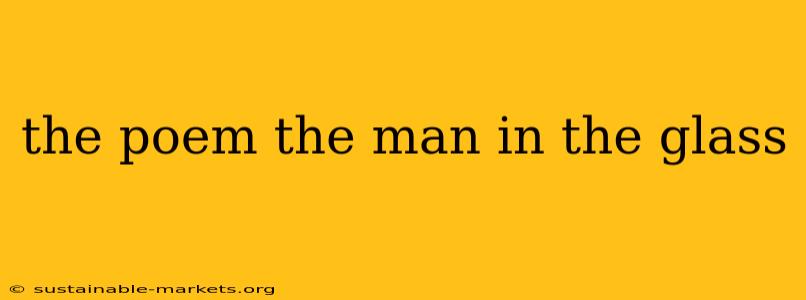Dale Wimbrow's "The Man in the Glass" is more than just a poem; it's a powerful call to self-accountability and a timeless reflection on integrity. This seemingly simple piece, often used in motivational settings, holds profound implications for how we perceive ourselves and the choices we make. Let's delve into its meaning, impact, and enduring relevance.
Understanding the Poem's Message
The poem centers on a powerful metaphor: the "man in the glass" represents our own conscience, our inner judge, and the ultimate reflection of our character. It's not about external judgment or societal expectations; instead, it focuses on the internal evaluation of our actions and motivations. The lines, "When you get what you want in your struggle for self, / And the world makes you king for a day," highlight the fleeting nature of external validation. True success, the poem argues, lies not in worldly achievements but in maintaining integrity and self-respect.
Key Themes Explored:
- Self-Respect: The poem underscores the importance of self-respect above all else. True success isn't merely about achieving goals; it's about the journey and the integrity maintained throughout. The "man in the glass" judges our actions based on this internal compass.
- Integrity and Honesty: The core message revolves around honesty with oneself. Are we living up to our own standards? Are we acting in accordance with our values, or are we compromising them for external gains? The poem implicitly challenges us to examine our ethical compass.
- Long-Term Perspective: While external rewards might be tempting, the poem encourages a long-term perspective. Lasting fulfillment comes from living a life aligned with one's personal values, not from short-lived triumphs. The lasting judgment is self-imposed, not externally dictated.
- Personal Responsibility: The poem powerfully emphasizes personal responsibility. We are ultimately accountable for our actions and choices. No one else can dictate our moral compass; it rests solely within our own hands.
The Enduring Impact of "The Man in the Glass"
The poem's enduring popularity stems from its universality. Its message transcends cultural and temporal boundaries, speaking to the inherent human desire for self-acceptance and a sense of purpose. It's a simple yet profoundly effective reminder of the importance of self-reflection and the need to align our actions with our values.
Applications in Modern Life:
- Leadership and Ethics: The poem serves as a crucial guide for leaders and decision-makers. It emphasizes the importance of ethical conduct, transparency, and personal accountability.
- Personal Development: "The Man in the Glass" offers a potent framework for self-assessment and personal growth. It prompts individuals to critically examine their actions and identify areas for improvement.
- Motivation and Inspiration: The poem's message of self-reliance and inner strength provides a powerful source of motivation for those facing challenges or striving to achieve their goals.
Conclusion: A Lasting Legacy of Self-Reflection
Dale Wimbrow's "The Man in the Glass" remains a potent symbol of self-reflection and personal responsibility. Its simple yet powerful message continues to resonate with readers across generations, reminding us that true success lies not in external validation but in the unwavering integrity of the "man in the glass"—the person we see when we look within. The poem’s enduring appeal lies in its ability to challenge us to live a life of purpose, guided by our own internal compass, rather than solely by external pressures. It is a timeless call to action, urging us to consistently strive for alignment between our actions and our values.

